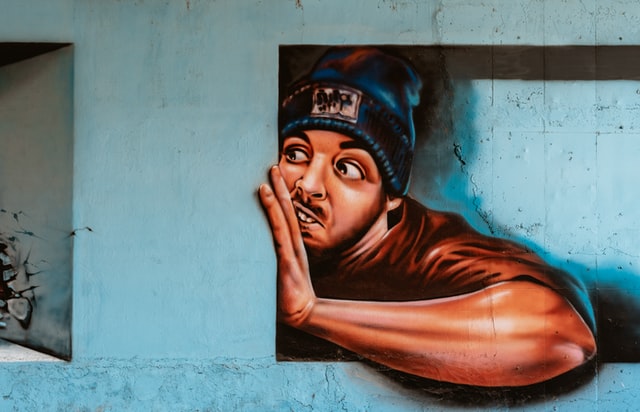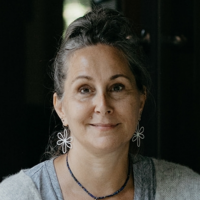Yesterday, I hosted my first in-person group event in more than 18-months.
It was a lot of fun and, as an introvert, also a bit stressful.
I know that for many people, the return to normalcy may be mentally and economically healing. But for me and other introverts I know, it feels like we are going through the turnstile at Disney World.
I like being alone, and am not sure I want to go back to socializing.
You can get a sense of my introverted tendencies by knowing that one of my intentions for the year 2020 was: “I embrace my introversion and my desire to be at home working alone, and have plenty of unscheduled time.” As a result of COVID-19, I was granted my wish to be working from home alone, only two months after I made it.
While considering how to manage what feels like so many upcoming in-person events, I turn, as usual, to the Buddha for advice. And it turns out he has some specific advice on this, in his sutras on “The Better Way to Live Alone” and “The Elder Sutra.”
Then, as now, call-out culture was a thing, and the Buddha was informed by his monastics that there was this one monk, Thera, who lived alone and didn’t want to do anything with the other monastics. They whined, “he always praises the practice of living alone. He goes into the village alone to seek alms, returns home from the village alone, and sits in meditation alone.”
The Buddha called Thera to him and asked him if all this was true. Thera replied that it was, and the Buddha said that was all just fine. But, he said, let me tell you an even better way to live alone.
He said, and I am paraphrasing here, that when we can see that the past no longer is, the future has not yet come, and when we can dwell without desires in the present moment, we have no more anxiety or regret, and are truly free to be “alone” in any situation. If, on the other hand, we cling to our memories, plans, and internal knots and fears, we are never truly alone, even when we aren’t with other people.
By practicing “The Better Way to Live Alone,” we can satisfy our need to be alone whether we are in a crowded bus, back at work, or meeting friends for coffee. As an introvert coming out of the Covid quiet, this practice has given me a lot of support.
There are three parts to its practice:
1. Do not pursue the past.
Lily Tomlin once said, “Forgiveness means giving up all hope for a better past.” Whether we are hoping for a better past or wishing we could go back to a better past, being caught in the past means we can’t be present for ourselves of the people we are with.
As we start to see people again, we may remember how they were in the past, and this may raise fears (if we didn’t like them in the past) or attachment (if we did). The truth is that every one of us is changing in every moment. Other people aren’t the same as they were before Covid and neither are we. Anything that happened in the past is stuck there since there is literally no way to go back to change it. Learn what you need to learn from the past and then forget it. This is how we stop pursuing the past.
2. Do not lose yourself in the future.
Being lost in the future creates anxiety. When we start to see other people, all the “what-if” questions may come up: what if I say something and embarrass myself, what if they don’t like me anymore, what if there’s food on my face?
The only way that I have found to let go of the future is to find an anchor in the present moment to come back to. One such anchor is our breath. “Breathing in—I feel my in-breath as my belly rises. Breathing out—I feel my out-breath as my belly falls.”
Another anchor could be your body sensations. Notice your feet on the ground or your seat in the chair. When social anxiety arises, you can greet it, “Hello, my old friend.” Have compassion for yourself and your anxiety, and then bring your attention back to the present moment. What sounds are in the room around you? Can you focus your attention on sounds for a few breaths?
Ask yourself, “Am I okay in this moment? Is the other person attacking me? Am I in danger?” If so, you’ll want to end the conversation. If not, you will know that your nervousness is coming from your own thoughts and you can breathe your way through them. This is how we stop getting lost in the future.
3. Do not be swept away by the present.
When we believe everything that we think, we are being swept away by the present. Typical introverted thoughts are, “This person is annoying me,” or, “I’d rather be reading my novel.” These thoughts are not a problem. The problems arise when you believe those perceptions are real and that you must do what they demand of you.
Let’s say you have an itch. That itch is real, it is happening, and you feel it. But you don’t necessarily need to scratch it. In fact, you will find that if you don’t scratch every itch, most itches peak after a few seconds and then disappear. It’s similar with thoughts. They are the result of infinite causes and conditions from your past, and don’t necessarily mean much, or require action.
If you have the thought, “This person is annoying me,” start by noticing what that thought feels like in your body-mind. Can you sense a contraction or an aversive reaction? Are your legs twitching to move?
Ask yourself: “what am I afraid might happen? What specifically is bothering me?” Then again ask, “am I sure?” Continue to feel your breath coming in and going out, and see whether the thoughts and your reactivity pass. It requires practice to discriminate between habitual thinking, and thoughts that require immediate attention. There are relatively few of the latter and millions of the former.
Another technique you can use to get clarity about what is happening in the present moment, is to ask yourself, “what would be different about being alone right now?” or, “what could I be doing if I were alone that I couldn’t be doing with this other person?” And again ask; “am I sure?”
As a result of doing your inner exploration, you may find that you want to make a request of the other person that could make your time together more easeful for you. You may want to take a short break and walk around the block—or you may ask for a pause in the conversation to help you re-ground. If there’s no obvious way to do that, a trip to the bathroom is a great option. You may ask the other person to slow down their speaking, or to speak more quietly, if that helps you.
Making time with others pleasant and easeful for you is the secret to enjoying it. If you aren’t able to ask for and have your needs respected, for any reason, then it is probably time to leave.
The Buddha’s teaching in “The Better Way to Live Alone’ is about knowing what kind of internal knots we are caught by and taking care of those knots—by letting them go, or investigating them—so that we are better able to dwell easily and happily with others. His teaching aims to help us feel as comfortable within community as we feel when we are alone.
As we come out of lockdown, this teaching can benefit us more than ever, especially we introverts.


 Share on bsky
Share on bsky





Read 4 comments and reply